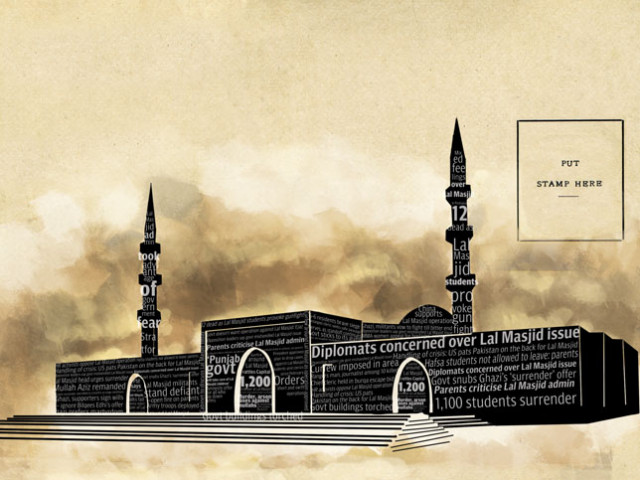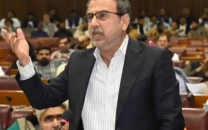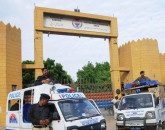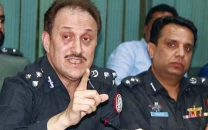Lal Masjid - IV: ‘Musharraf predicted our doom’
Jamia Hafsa’s Umme Hassan says she has nothing to be ashamed of.

The damp and crowded Jamia Summaiya, where Umme Hassan and Maulana Abdul Aziz now live, is a far cry from the spacious Jamia Hafsa that their colleagues recall fondly. It was one of the madaris that absorbed the students of Jamia Hafsa after Operation Silence.
While students wash clothes and dishes, others take afternoon naps on charpoys. I am ushered into an office. A calendar of the Pakistan Air Force hangs on a wall, along with lists of duties, announcements and class schedules.
After a short wait, Umme Hassan walks in. In her crumpled shalwar kameez and hastily placed dupatta, she is a plump, homely figure who refuses to be photographed without a burqa.
She idly converses with people who walk into the office and asks for tea. Umme Hassan could be a friendly neighbour, an old relative, a fellow shopper haggling over the price of fabric.
But her reputation precedes her. She was the notorious principal of Jamia Hafsa, whose stick-wielding female students became the face of militancy in Pakistan’s capital.
Now, she says, she is feted and recognised wherever she goes. “We have our detractors as well, but most people support us and care for the sacrifices we have made. The truth has been revealed, and they realise that we were not what we were portrayed to be. The people that did not know of us before now respect us.”
She speaks animatedly on every issue, from the siege of Lal Masjid to former Punjab Governor Salmaan Taseer’s assassination, peppering answers with anecdotes and the occasional couplet. She criticises Taseer for his “public support of the Ahmadiyya community” – “if that was his personal view, he should have kept it to himself” – and predicts that the next regime will be completely Islamic in nature.
And she has no regrets over the events that led to the military operation.
“Whatever we did,” she says, in a matter-of-fact way, “was for the country’s betterment. We had the support of the people. Islam teaches us to spread the message. But the group belonging to Musharraf’s class … they kept speaking out.”
She says she never expected that there would be a military operation, which she calls a “black chapter” in the country’s history. “We thought they were just threatening the children with this. We had hoped we could reconcile if the government accepted our demands.”
During the siege, she says she encouraged students to leave. “There were students who said they would not go. We had girls who were orphans – they had no parents or guardians – where would we have sent them?”
“There were no arms discovered, nor any terrorists. They bulldozed Jamia Hafsa to hide the proof of what they had done. Look at the images of the siege; you can see the blood they shed. One girl had 11 bullets in her.”
“I don’t have any grudges against people. I do have a problem with the ulema. They never seriously tried to resolve the issues.”
The Wafaqul Madaris Arabia said it would not recognise or support their activities, but reportedly apologised later during a conference at Lal Masjid. “Did they ever apologise to us directly? Just because they admitted their mistake does not mean they have been forgiven. I heard people put their turbans at the feet of clerics and begged them to save us. The politicians said they were powerless. I believe even army soldiers protested at having to participate in the operation, but they had their orders. They have all wronged us.”
“Musharraf shamed the daughters of this country. Look at the case of Dr Aafia Siddiqui. He has challenged God, and God will not spare him. Kab tak maut ko mohlat milegi? (How long will death get a respite?)”
“We have nothing to be ashamed of,” Umme Hassan says decisively. “Hamare shuhda ki qabron se khushbu aati hai, tilawat ki awaz aati hai. (Scent arises from our martyrs’ graves. One can hear Quranic recitation). It may have seemed like this was Musharraf’s victory. But the real victory was ours. He predicted our doom. We are free but he cannot come back to Pakistan.”
Published in The Express Tribune, March 16th, 2011.


















COMMENTS
Comments are moderated and generally will be posted if they are on-topic and not abusive.
For more information, please see our Comments FAQ